Whether you are doing SEO, pay-per-click advertising, or social media marketing, seasonal keywords can be a great way to boost your website’s visibility.
So, are you ready to get the most out of the next holidays, events, or seasons?
Here’s everything you need to know about these trending keywords, from what they are to how to find them.
Contents:
What Are Seasonal Keywords?
Seasonal keywords are search terms that experience a surge in popularity during specific times of the year.
These terms are often related to holidays, events, or seasons and can vary based on location and culture.
For example, “Christmas decorations” would be considered a seasonal keyword since it is more popular during the holiday season.
From this Google Trends chart, you can see that people are searching for this query starting in September, reaching a peak in December.
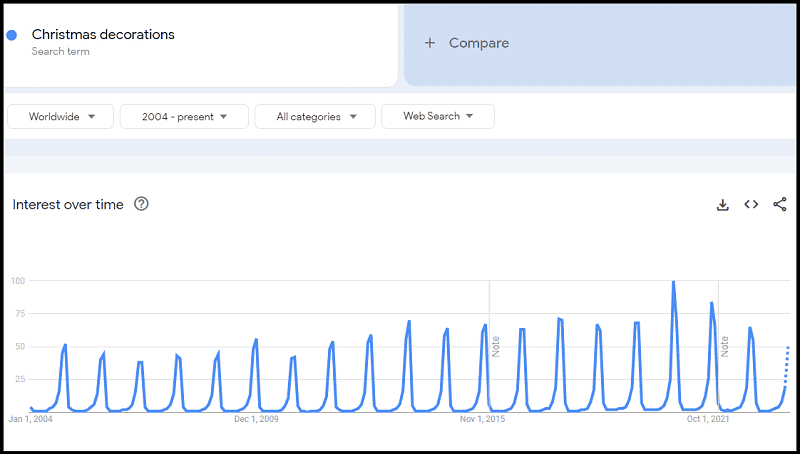
Using these terms and optimizing your content for them can help attract relevant traffic to your website and potentially increase conversions.
For instance, let’s say you decide to optimize your website for the keyword “Christmas decorations”.
If you start this process in November, you might find yourself a step behind. By that time, people will probably have begun their Christmas shopping, and your competitors may already have in place their content strategy.
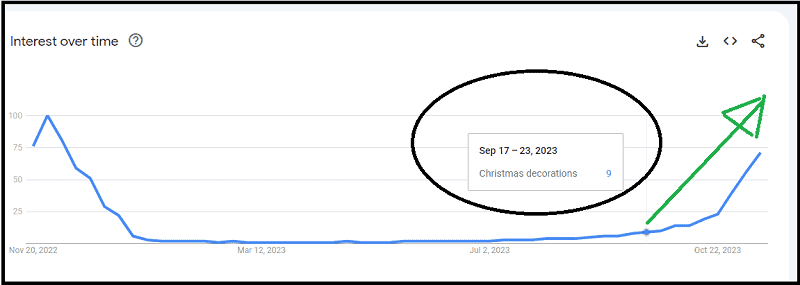
However, if you start optimizing in September, you can get a head start on the competition and significantly increase your chances of ranking well for these keywords.
This early optimization allows you to capture the attention of potential customers who are actively searching for Christmas decorations, giving you a competitive edge in the market.
Why Are Seasonal Keywords Important?
There are several compelling reasons why seasonal keywords are important for your marketing strategy:
- Increased Traffic and Sales. By targeting these specific keywords and ranking for them, you can attract many visitors to your website. This spike in traffic can translate into higher sales and conversions, especially during peak seasons or holidays.
- Relevance and Timing. Seasonal keywords are time-sensitive and align with specific events or trends. Identifying when people are actively searching for them and planning your marketing efforts accordingly is crucial. By staying ahead of the curve, you can target your audience when they are most receptive.
- Competitive Advantage. By planning the content creation and optimization well in advance, you gain a competitive edge over your competitors. Starting early allows you to establish a strong presence in search results before others catch up, giving you a better chance of ranking well and attracting more traffic.
- Enhanced SEO Strategy. Incorporating these terms into your marketing strategy makes it more focused and effective. By tailoring your content and optimizing for them, you can better align with user intent and capture relevant visitors. This level of targeting can lead to higher engagement and improved conversions.
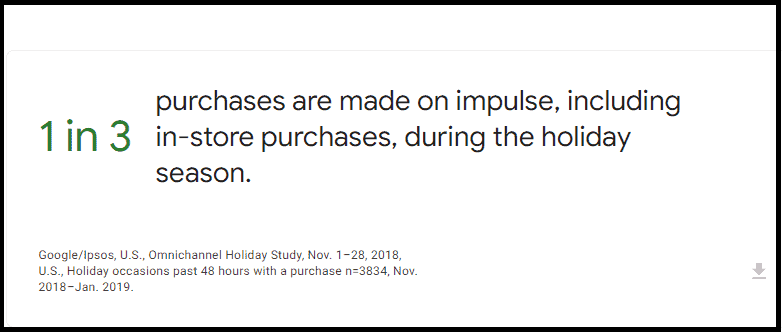
It is essential to note that not everyone can benefit from keyword seasonality.
For instance, a company selling winter gear would likely succeed more with these terms than a software development agency.
Seasonal Keywords Examples
The best way to understand the concept is by looking at some examples.
Here are a few popular seasonal categories:
- Holidays: Christmas, New Year’s Eve, Valentine’s Day, Halloween.
- Events: Super Bowl, Black Friday, Cyber Monday.
- Seasons: Spring break, summer vacation, back-to-school season.
Let’s consider New Year’s Eve as the first case.
During December, there is a significant spike in searches for keywords related to New Year’s Eve celebrations, such as “New Year’s Eve party ideas,” “New Year’s Eve dresses,” or “New Year’s Eve events.”
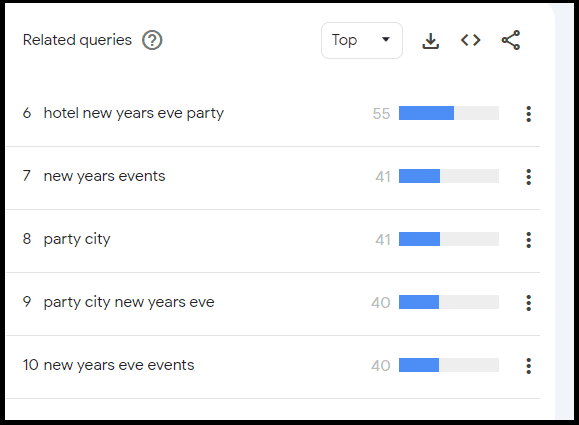
If you plan your content and campaigns around these terms well before the peak season, you can increase your chances of capturing this search traffic and engaging potential customers.
Similarly, the “Back to school” season is another opportunity to target seasonal keywords.
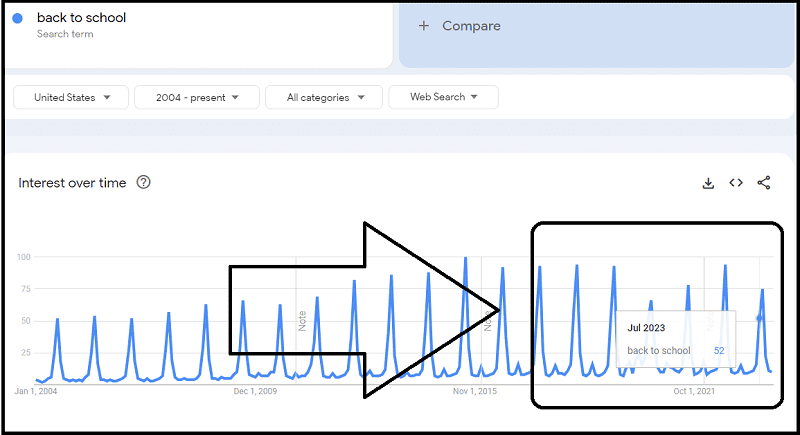
During this time, people are searching for school supplies, backpacks, or clothing. By optimizing your website for these terms in July, you can attract relevant traffic and increase sales during this busy shopping period.
Seasonal Keywords VS Evergreen Keywords
Evergreen keywords are search terms that remain consistent throughout the year and do not experience significant changes in popularity.
The main difference lies in their search volume trends.
While seasonal keywords have a peak season where they experience high search volume, evergreen keywords maintain a consistent search volume throughout the year.
For instance, “on-page SEO” is an evergreen keyword.
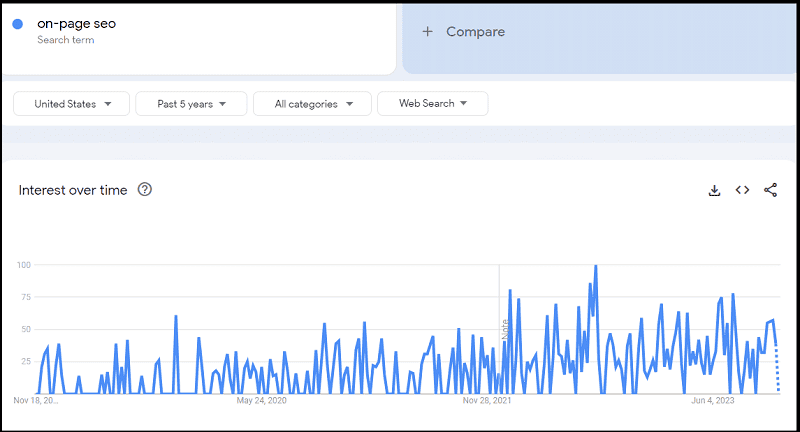
While “Black Friday” is a seasonal keyword.
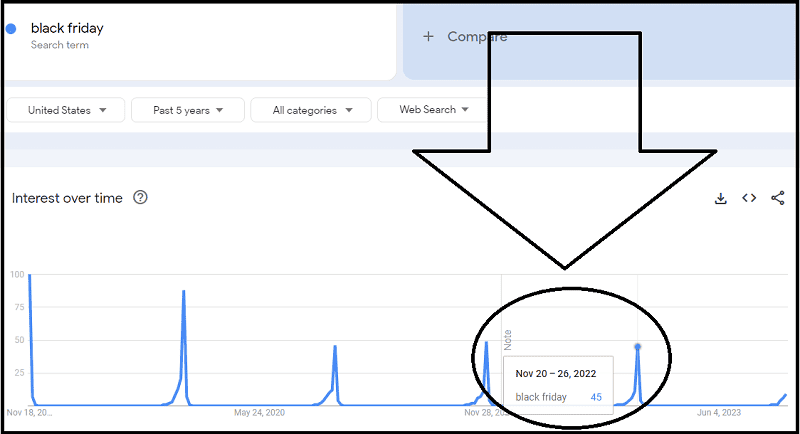
The first one will have a relatively consistent search volume throughout the year, while the second one will see a spike in searches around November.
Understanding this difference is crucial for your SEO strategy, as it can help you determine when to target specific keywords and optimize your content for them.
How to Find Trending Topics and Seasonal Keywords?
You need to have a strategic approach. Here are some tips to help you during the process:
- Identify Events and Holidays Relevant to Your Business
- Use Keyword Research Tools
- Analyze Your Competitors
- Leverage Google Trends
1. Identify Events and Holidays Relevant to Your Business
Start by researching the events, holidays, and seasons that are relevant to your industry.
For example, if you sell gardening supplies, “spring” will likely be a crucial season for your business.
Similarly, if you provide tax preparation services, “tax season” is an event that you should target.
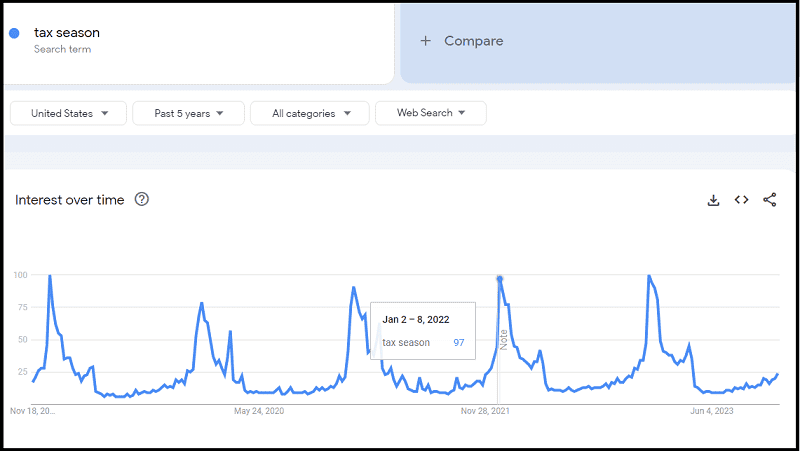
Make a list of these relevant events and holidays, as they will serve as the basis for your seasonal keyword research.
2. Use Keyword Research Tools
There are many tools available that can help you identify trending topics and seasonal keywords.
Some popular options include:
- Google Keyword Planner
- SEMrush
- Ahrefs
- Keyword Surfer
Thanks to all of them, you can input your list of terms to get insights into the search volume trends for related queries.
Google Keyword Planner
To use this tool, start by signing up for a Google Ads account.
Once logged in, go to the Tools section and select Keyword Planner.
Next, click on Discover new keywords.
Enter your list of keywords and select your target location and language.
The tool will then generate a list of related terms, along with their search volume trends.
For example, if you input “New Year’s Eve” the tool will provide you with related ideas such as “Things to do for New Year’s Eve” or “New Year’s Eve parties.”
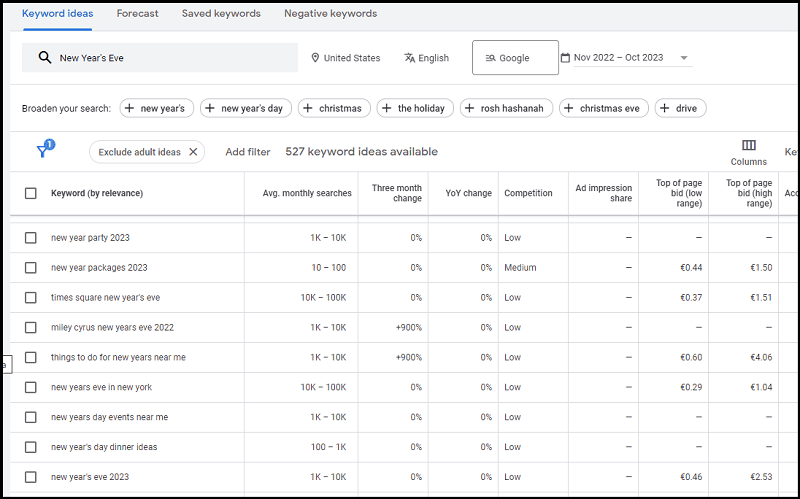
Semrush
Semrush’s Keyword Magic tool is another great option.
Simply enter a seed keyword, such as “Cyber Monday“, and the tool will generate a list of relevant terms along with the search volume:

As well as related questions:
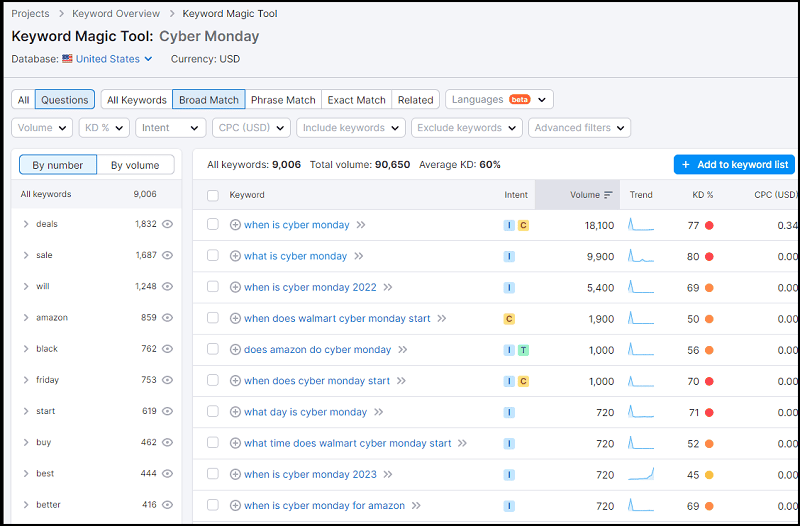
Ahrefs
Ahrefs’ Keyword Explorer is currently what I’m using for finding everything you need to know about keywords (if you don’t have a paid plan there, you can use their Free Keyword Generator tool).
You can input a seed term, such as “Valentine’s Day:”
You can then analyze tons of data such as keyword difficulty, search volume trends, and traffic potential.
For example, if you click on “Keyword ideas”, you can view related terms, as well as clusters, and SERP features:
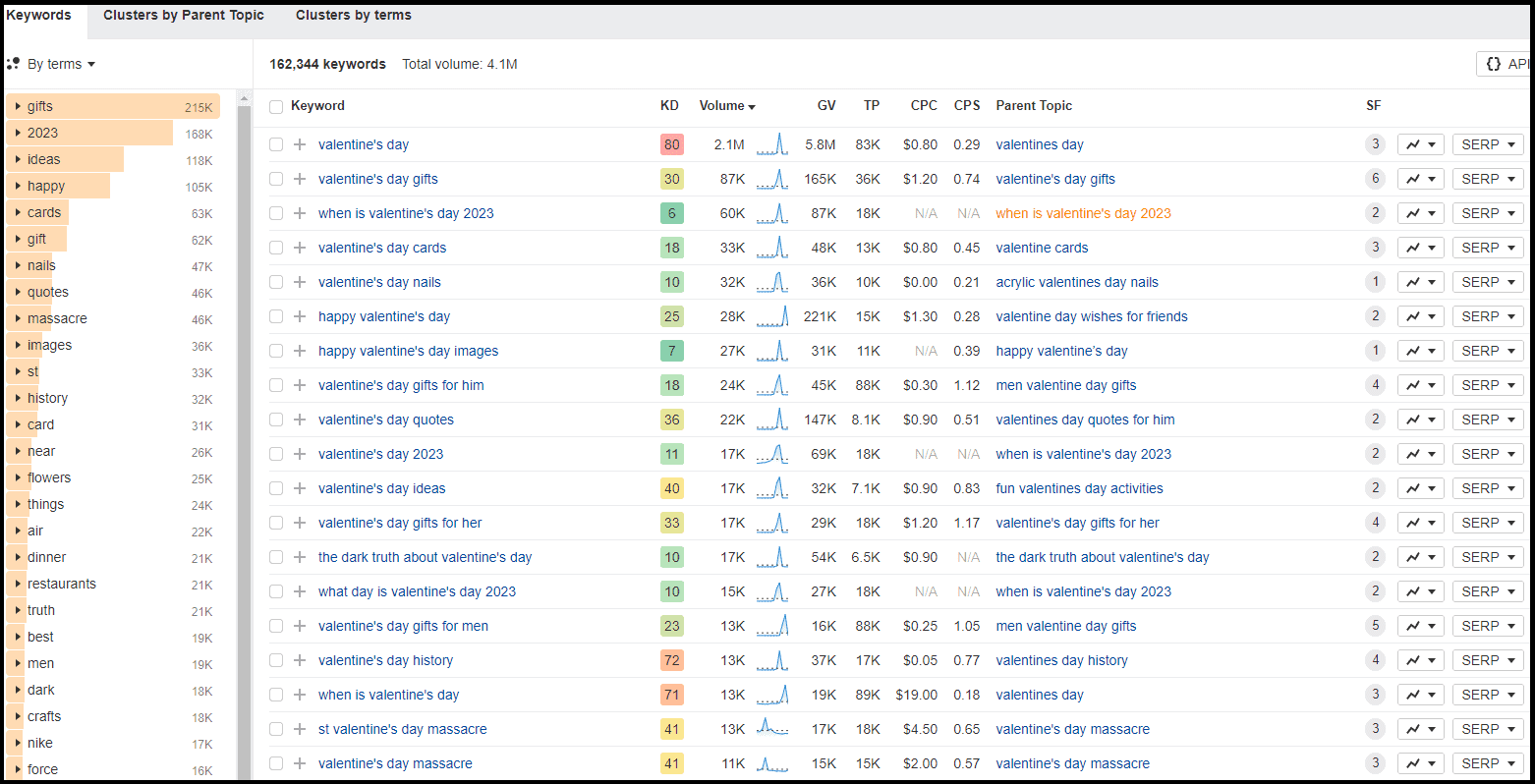

Keyword Surfer
Keyword Surfer is a free Chrome extension that allows you to get useful data directly from Google Search.
After installing the extension, go to Google and type in your seed term.

The tool will display related keywords with their search volume data:
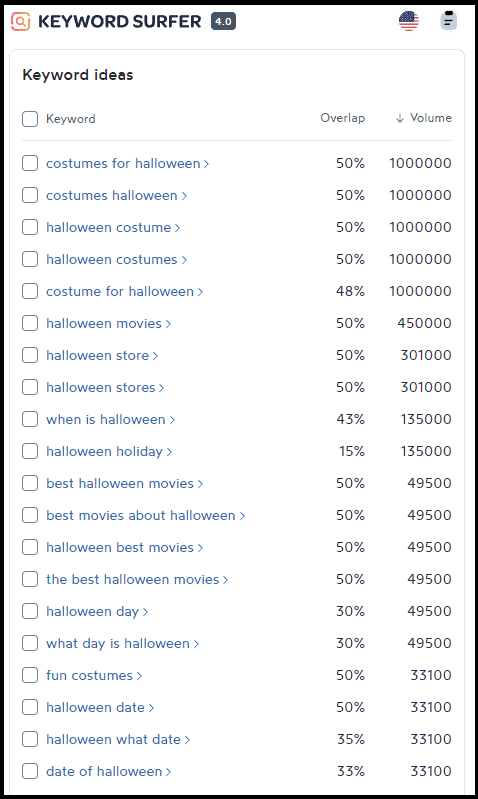
3. Analyze Your Competitors
Another way to find relevant seasonal keywords is by looking at what your competitors are doing.
Analyze their website content, social media posts, or blog posts to see which topics they are currently targeting. This can give you an idea of the type of terms that you should be focusing on as well.
Here are the practical steps I recommend.
On Google, search for a seed keyword and take note of the first results that appear. These are your main competitors.
For example, if you were targeting the seasonal term “summer vacation“, you could find this website:

Additionally, you can try this search operator (unfortunately, it’s not as accurate as it used to be):
related:yourwebsite.com
Then, fetch the URLs you found to your favorite SEO tool.
For me, it’s Ahrefs, the “Site Explorer” feature.
Simply enter your competitor’s website to analyze it and look for the organic keywords it is ranking for, to get new ideas:
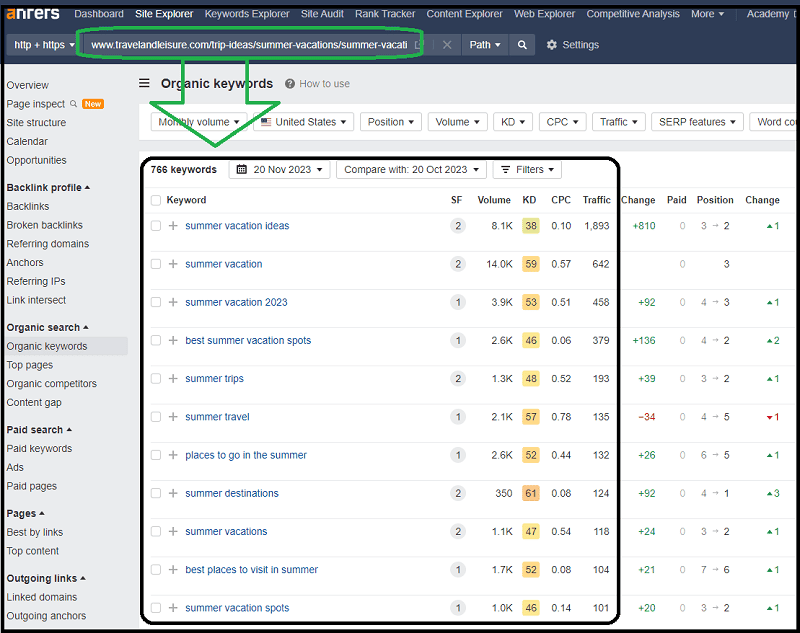
If you filter per KD (keyword difficulty), you can steal its most profitable opportunities:
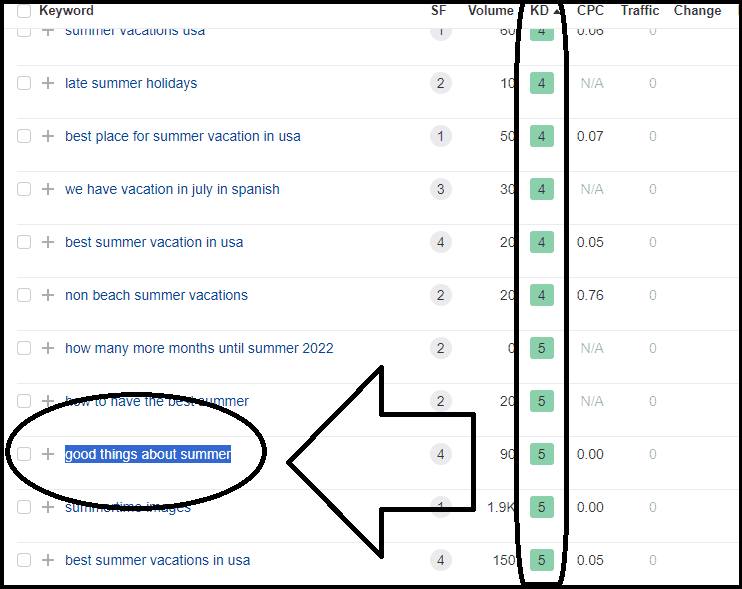
For example, the keyword “good things about summer” could be both a seasonal-related term but also an evergreen keyword (with a KD of 5, which means an easy-to-rank term).
4. Leverage Google Trends
Google Trends is the most popular choice when looking for trends, or keyword seasonality.
With it, you can find the search volume chart for a specific term over time.
Or, you can compare multiple terms or topics to see which one has more interest from users.
For example, if you want to see which term has more search interest between “Black Friday” or “Cyber Monday”, you can use this tool to get a definitive answer.
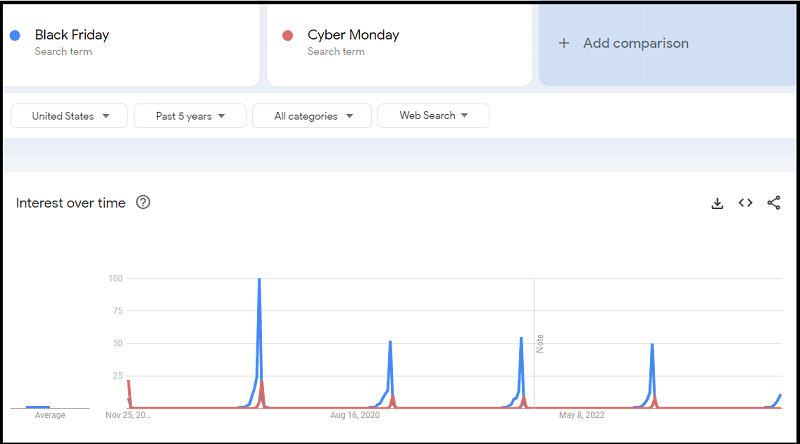
Some practical tips for using Google Trends:
- Identify Seasonal Peaks. Use the “Past 5 years” filter and take note of peaks for your industry. These are probably terms that have seasonal relevance, and you should target them.
- Discover New Keywords. Type in a seed term, then scroll down to see related queries. This can give you some ideas for new keywords to target that are related to your industry or niche.
- Compare Terms. Use the “vs.” feature to compare two terms and see which one has more search interest over time. You can also add more terms to compare and get a visual representation of their search volume trends.
- Explore by Location. You can filter your results by location to see if there are any geographical differences in search interest for the terms you are targeting. This can be helpful if you have a local business or are targeting specific regions.
FAQs
Here are some of the most commonly asked questions about seasonal keywords.
Q: How can optimize your content for seasonal keywords?
A: Make sure to include them in your content naturally. This means using them in headings, subheadings, and throughout the body of your text. You can also create specific landing pages or blog posts centered around these keywords (follow this checklist as a reference).
Q: How do I know if a keyword is seasonal?
A: The best way to determine if a keyword is seasonal is by using research tools, such as Google Trends. It will show you the search volume trends for a specific term over time, which can help you identify if it has any seasonal patterns.
Q: What are the best seasonal keywords to target holiday shoppers?
A: Some of the best seasonal keywords to target holiday shoppers include terms related to specific holidays, such as “Christmas gifts” or “Valentine’s Day deals.” You can also target more general terms like “holiday sales” or “gift ideas for [specific holiday].”
Q: Can I use seasonal keywords in my PPC campaigns?
A: Yes, you can use seasonal keywords in your PPC campaigns. Targeting these keywords can be very effective in driving traffic and conversions during peak seasons. Just like with organic SEO, make sure to do thorough keyword research and create targeted ad copy for each seasonal term you are targeting.
Q: How often should I update my content for seasonal keywords?
A: It’s recommended to update your content at least once a year, preferably before the start of a new season. This will ensure that your copy is fresh and relevant for the current season. However, it’s also important to regularly monitor keyword trends and make updates as needed throughout the year if you notice any significant changes in search volume or user behavior.
Q: What are the top Christmas keywords?
A: Some of the top Christmas keywords include “Christmas gifts”, “holiday sales”, “stocking Christmas bags”, and “Christmas decorations.” You can also target more specific terms like “Christmas gift ideas for mom/dad/brother/etc.” or “Christmas deals on [specific product].”
Q: Are seasonal keywords only relevant for e-commerce businesses?
A: No, seasonal keywords can be relevant for any type of business or industry. Even if you don’t sell products directly, you can still use these keywords in your content marketing strategy to increase traffic and engagement during peak seasons. For example, a healthcare brand may target seasonal terms related to flu season, while a travel company may use “summer vacation destinations.”
Q: How to create a seasonal SEO calendar?
A: To create a seasonal SEO calendar, start by identifying the peak seasons for your industry or niche. Then, research and compile a list of relevant keywords to target during each season. Plan out when to update your content, launch new campaigns, and make any necessary changes based on keyword trends.
Before You Go
Now that you know how to find seasonal keywords, it’s time to create a compelling, optimized copy!
Be sure to follow the tips included in these guides:
Now, it’s over to you.
What’s your experience with keyword seasonality?
Please share your experience in the comments below!

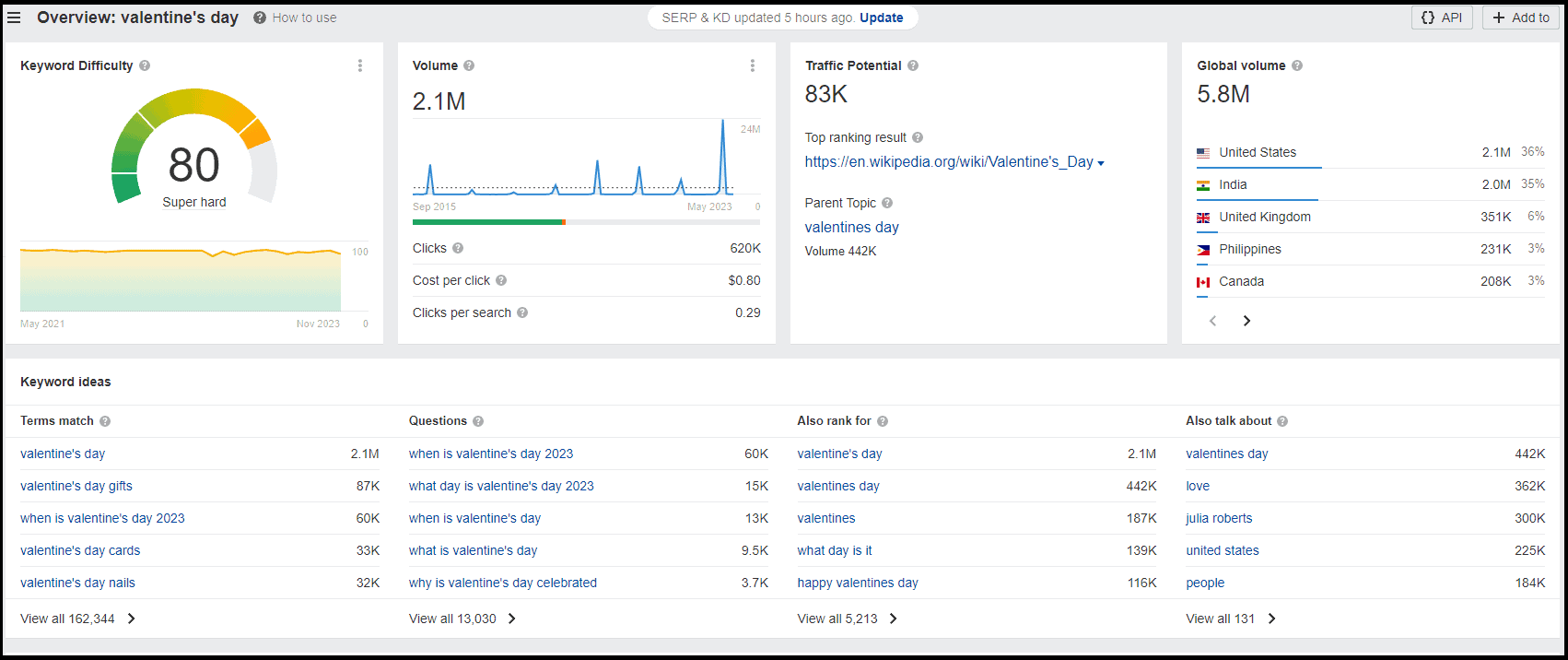
Really helpful post. I like the idea of seasonal keywords and holiday marketing. It’s a great strategy to keep publish relevant content all year long. If you update quarterly you can naturally include the keywords and probably earn backlinks from media outlets or other bloggers. I keep a running calendar.
I appreciate the positive feedback, Norm.
Glad you liked the tips to capitalize on seasonal keywords.
Seasonal keywords really experience an abnormal surge in popularity during a specific time.
Today is the second time I’ve read a post regarding seasonal keywords.
Emanuelli, thank you for your perspective.
You always impress me .
It looks like “seasonal keywords” is trending right now, then! 🧐
Thanks for the good comment, Foster.